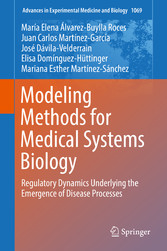Modeling Methods for Medical Systems Biology - Regulatory Dynamics Underlying the Emergence of Disease Processes
von: María Elena Álvarez-Buylla Roces, Juan Carlos Martínez-García, José Dávila-Velderrain, Elisa Domíngu
Springer-Verlag, 2018
ISBN: 9783319893549
, 258 Seiten
Format: PDF
Kopierschutz: Wasserzeichen
Preis: 96,29 EUR
eBook anfordern 
Mehr zum Inhalt

Modeling Methods for Medical Systems Biology - Regulatory Dynamics Underlying the Emergence of Disease Processes
This book contributes to better understand how lifestyle modulations can effectively halt the emergence and progression of human diseases. The book will allow the reader to gain a better understanding of the mechanisms by which the environment interferes with the bio-molecular regulatory processes underlying the emergence and progression of complex diseases, such as cancer. Focusing on key and early cellular bio-molecular events giving rise to the emergence of degenerative chronic disease, it builds on previous experience on the development of multi-cellular organisms, to propose a mathematical and computer based framework that allows the reader to analyze the complex interplay between bio-molecular processes and the (micro)-environment from an integrative, mechanistic, quantitative and dynamical perspective. Taking the wealth of empirical evidence that exists it will show how to build and analyze models of core regulatory networks involved in the emergence and progression of chronic degenerative diseases, using a bottom-up approach.
María Elena Álvarez-Buylla Roces is a professor in the Department of Functional Ecology, Institute of Ecology of the National Autonomous University of Mexico (UNAM). She obtained her PhD from University of California, Berkeley, in 1992. She was a postdoctoral researcher at University of California, San Diego, and a Miller Professor at the University of California, Berkeley. She is Coordinator of Research at the Center of Complexity Science of UNAM. Her scientific research is focused on systems biology combining experimental, evolutionary, ecological and theoretical/computational approaches geared towards? the understanding of system-level mechanisms underlying biological development and their role in complex diseases.?
https://ssl.gstatic.com/ui/v1/icons/mail/images/cleardot.gif
Juan Carlos Martínez-Garcia is a professor at the Automatic Control Department of the Center for Research and Advanced Studies of the National Polytechnic Institute of Mexico. He obtained his PhD in Mathematical Control Theory from Ecole Centrale de Nantes, France, in 1994. His research interests concern regulatory dynamics in cell biomolecular systems, as well as the mathematical and computer-based description of chronic diseases, through the systems biology perspective.
José Dávila-Velderrain earned a PhD at the Institute of Ecology, UNAM. He is presently a researcher at the Computer Science and Artificial Intelligence Lab, Massachusetts Institute of Technology & The Broad Institute of Harvard and MIT. His research interests are focused on the application of advanced bioinformatics as well as mathematical modeling for the understanding of complex biological dynamical systems.
Elisa Domínguez-Hüttinger is a researcher at the Center of Complexity Science of UNAM. She obtained her PhD in Bioengineering from Imperial College London (2015). She also completed a postdoctoral fellowship (2016-2018) at the Institute of Ecology, UNAM. She is concerned with medical systems biology, mainly focused on the study of multi-scale dynamical processes underlying chronic diseases.
Mariana Esther Martínez-Sánchez is a posdoctoral research fellow at the Institute of Ecology and Center for Complexity Science at UNAM. She earned her PhD at the Institute of Ecology, UNAM, and is presently working in unravelling the complex system-level mechanisms underlying T CD4+ cell differentiation and plasticity that participate in inmunogenic responses and inmunological diseases.









